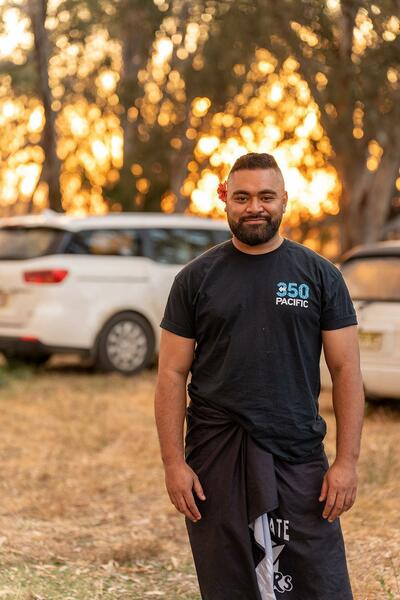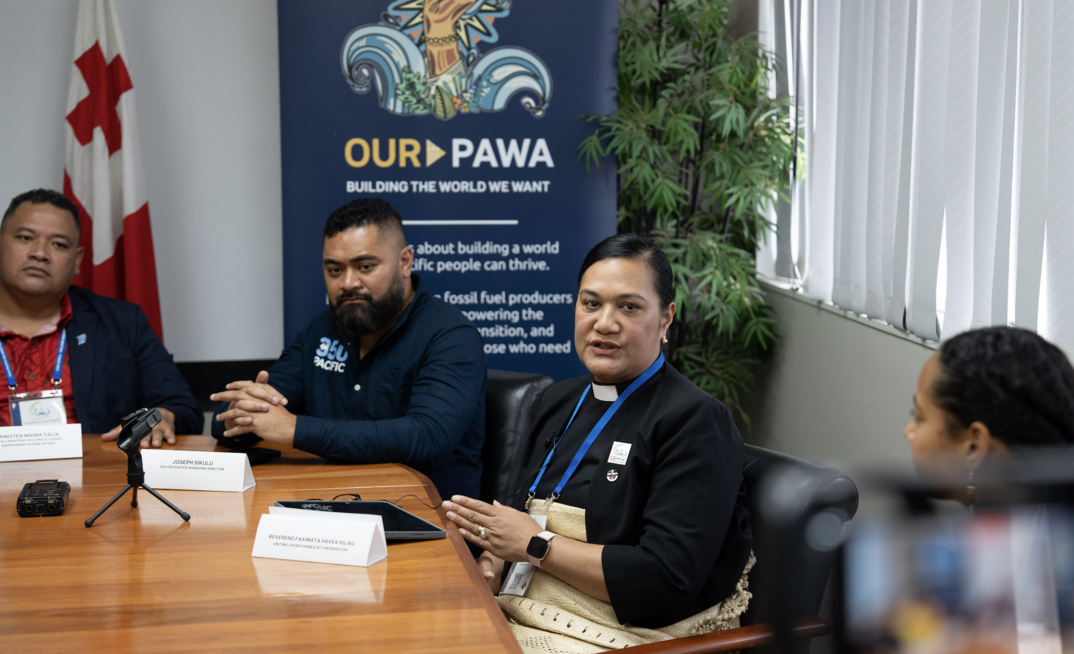On the shores of the Pacific, where the vast ocean meets fragile islands, a quiet yet powerful movement is taking root. At the forefront is Joseph Sikulu, a Tongan climate campaigner whose life journey spans from the idyllic archipelagos of Ha'apai and Vaini in Tongatapu to the bustling suburbs of Western Sydney, where he grew up in Dharug country.
Sikulu, an environmental, cultural, and queer activist, has spent the last decade building a resilient network of Pacific Climate Warriors. This movement extends across the islands and into diaspora communities around the world. His work as a member of the Secretariat for the Pacific Climate Warriors and a Pacific Champion for the Fossil Fuel Nonproliferation Treaty has positioned him as a leading voice in the fight against climate change—a battle that is existential for his people.
A region at a crossroads
The Pacific Islands face many challenges, making the transition to renewable energy daunting. Geographic isolation, dependence on imported fossil fuels, a lack of technical expertise, and vulnerability to climate change are just a few of the obstacles. Financial constraints, grid integration issues, political and regulatory hurdles, and the need for community engagement add layers of complexity.
As the Pacific Islands Forum Leaders Meeting convenes this year under the theme "Transformative Resilient Pasifika: Build Better Now," Sikulu sees a pivotal moment for the region. The meeting, which will take place in Tonga, offers an opportunity to push for a fair and sustainable shift to renewable energy across the Pacific. This shift, Sikulu believes, is crucial not just for energy security but also for the survival of the islands themselves.
"Given that Australian Prime Minister Anthony Albanese and Federal Energy Minister Chris Bowen both have a significant Tongan constituency in their respective electorates, we hope that these Australian leaders will leave with a better understanding of the energy transition challenges faced by Tongan Islanders," Sikulu says. "We also hope that they will be more determined to bring Australia's support to help address the issues affecting the Pacific region.
Resilience in the face of adversity
For Sikulu, the concept of "Build Better Now" resonates deeply with the current reality of the Pacific. The need for resilient, renewable energy sources has never been more urgent. "Our energy grids are unstable because a lot of our energy is imported through fossil fuels," he explains. "In the aftermath of a disaster, one of the things we lack most is access to energy. Building renewable energy grids within our islands isn't just about transitioning to cleaner energy—it's about ensuring that we can continue to have access to energy, especially after a disaster."
The devastation following natural disasters in the Pacific underscores the fragility of the island's energy infrastructure. Sikulu recalls scenes of people huddled in churches, the only places with backup generators, desperately trying to charge their phones to reach loved ones. "It's a stark reminder of what we take for granted in places like Australia or New Zealand," he says.
Breaking the fossil fuel dependency
Despite contributing a mere 0.06% of the world's carbon emissions, the Pacific's reliance on fossil fuels remains a significant concern. "The technology is available now to help our people transition away from fossil fuels," Sikulu points out. "But finance is the biggest barrier. Renewable energy technologies are expensive, and our governments need the financial support to implement these strategies."
Sikulu is advocating for stronger climate finance and loss and damage funds from developed countries—particularly from those responsible for the climate crisis. "We hope that the countries, governments, and corporations that have caused this crisis can help us transition to make our communities more resilient."
A call for global support
As the Pacific grapples with the challenges of climate change, Sikulu emphasises the need for international cooperation. "Last year, the Kimura report showed that a fraction of what Australia spent on fossil fuel subsidies could transition eight entire nations to renewable energy," he says. "It's about changing the flow of finances to support our islands."
The Pacific's unique vulnerability to climate change requires renewable energy projects that can withstand extreme weather events and rising sea levels. "There's a lot of experimentation happening around different renewable energies," Sikulu notes.

We need to ensure that whatever energy source we create isn't just going to end up as 30 solar panels in the sea once the sea levels rise.
Cultural sensitivity and community support
For Sikulu, the success of renewable energy projects in the Pacific hinges on cultural sensitivity and community engagement. "Consultation is critical," he says. "We're conducting a region-wide survey to understand what our communities know about renewable energy and what they want. Our role is to ensure our community is consulted and to find the right partnerships to help transition our people."
As Australian Prime Minister Anthony Albanese and Energy Minister Chris Bowen attend the Pacific Islands Forum, Sikulu hopes they will leave with a renewed commitment to supporting Pacific nations. "These leaders represent electorates with many Tongan people, areas that hold a lot of our culture," he says. "I hope they take this understanding back home and implement it, ensuring that Pacific priorities take the lead, especially with Australia set to host the UN Climate Summit in two years. Let's make the Pacific the centre of this effort."
The Pacific's unyielding spirit
As the Pacific Islands Forum unfolds, Sikulu reflects on the resilience and spirit of his people. "Today's opening was about centring everything we are as Pacific Islanders—our culture, our music, our dance," he says. "Even through adversity, we continue to smile, dance, and put our best foot forward. That's who we are, and that's what we're fighting to protect."
In the heart of the Pacific, where the stakes are high and the challenges immense, Joseph Sikulu and the Pacific Climate Warriors are leading the charge for a sustainable future. Their message is clear: the time to act is now, and the world must stand with the Pacific in this fight for survival.
























